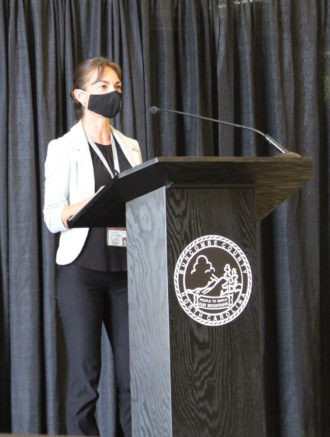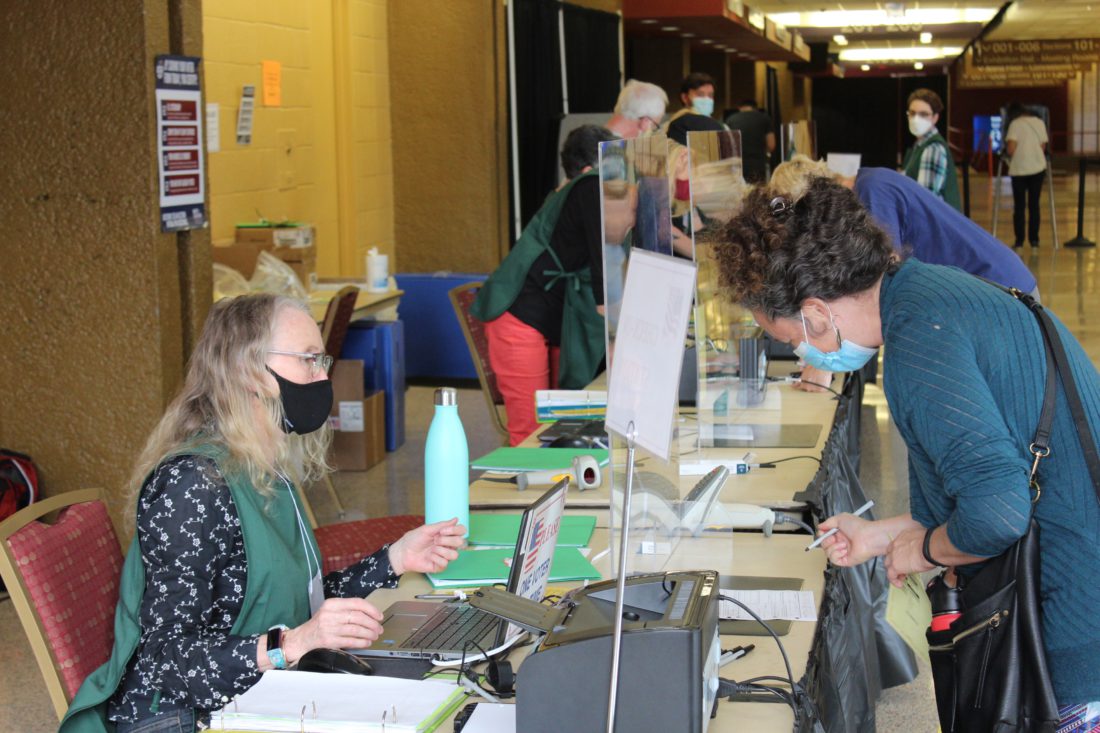The Tuesday after the first Monday in November usually marks the end of the yearly limelight for Corinne Duncan. She’s worked with Buncombe County Election Services since 2015 and was named its director in January. “After Election Day, everyone ignores us. We’re done,” Duncan says about her prior experience in the office.
That won’t be the case in 2020.
The period between the closing of polls on Tuesday, Nov. 3, and the official declaration of results on Friday, Nov. 13, has already become the subject of intense legal debate. Multiple state and federal lawsuits are seeking to shift the rules around precisely which absentee-by-mail ballots can be accepted.
Such matters have taken on outsized importance due to the COVID-19 pandemic. With many Western North Carolina voters worried about contracting the coronavirus at in-person polling places, more have chosen to vote by mail than ever before. As of Oct. 19, according to the nonprofit Civitas Institute’s VoteTracker, 22,704 general election ballots had been accepted by mail in Buncombe County; fewer than 5,800 county residents voted by mail in the entire 2016 general election.
Much of the wrangling in the court system lies outside local control. But Duncan and other WNC officials stress they’re doing everything possible to ensure that, no matter how long it takes, all eligible votes will be counted, and the final results will accurately reflect the voice of the people.
Loose ends

Because of the way North Carolina counts votes, Duncan explains, the totals reported on election night tend to be closer to the final tally than in other states. Starting on Sept. 29, county boards of elections have met regularly to review every ballot received by mail. Accepted ballots are then scanned and tabulated by voting machines so the results can be ready to post after polls close. In contrast, states such as Pennsylvania, South Carolina and Wisconsin aren’t allowed to start processing mailed ballots until Election Day.
The volume of voting by mail has been unusually high this year, notes Duncan, and some of the earliest ballots Buncombe County received weren’t accepted until several days after they came in. In response to the backlog, she says, the county added more Board of Elections meetings each week and hired temporary workers to speed up the process. Turnaround time is now fast enough to clear the stack of ballots each day, she says, similar to 2016.
Add in the results of in-person early voting and Election Day itself, says Buncombe County Board of Elections Chair Jake Quinn, and the results posted to the N.C. State Board of Elections website by the end of Nov. 3 will represent a “huge percentage” of all ballots cast. Remaining to be counted will be mailed ballots still in the postal system and provisional ballots (those cast pending determination of a voter’s eligibility).
Current rules require ballots to be postmarked by Election Day and received by Friday, Nov. 6, but that deadline could be extended to Thursday, Nov. 12, pending a federal ruling. Quinn suggests that an extension might allow a handful of additional votes to be counted; he notes that Buncombe County rejected 68 mailed ballots for lateness in the March primary election, for which just over 1,300 mailed ballots were accepted. An additional 10 ballots arrived in the three-day window after polls closed but were rejected because they lacked a proper postmark.
“That’s a heartbreaker for me, because that’s a citizen who did everything they were supposed to do to get their absentee ballot counted, and due to something completely outside of their control, it ended up not being counted,” Quinn says. He emphasizes that the county has been working closely with the local post office since the March primary to prioritize quick and proper handling of election mail.
Just over 1,000 Buncombe County ballots were voted provisionally in 2016, Duncan says, with most problems due to issues with voter registration or residents voting at incorrect precincts. Although checking those ballots represents “the most time-intensive voting process,” she adds, Buncombe’s electronic voter records allow county elections officials to validate provisional votes more quickly than their counterparts in some other North Carolina counties who still rely on paper.
Every vote counts
Those late-counted votes make up a small percentage of the total — the 474 provisional ballots accepted in the 2016 presidential election, for example, represented just 0.34% of the 140,021 ballots cast — but they can still alter the fortunes of candidates with an apparent Election Day lead. Quinn recalls a 2012 race for the Buncombe County Board of Commissioners between Democrat Ellen Frost and Republican Christina Merrill, which Frost won by 18 votes after a review of provisional ballots cast by students at Warren Wilson College.
“We are Americans and we demand instant gratification!” Quinn says with a laugh. “But [2012] just drove home the point that the election is not over on election night. People can’t cast any more ballots, but until every last vote is tabulated, it ain’t over.”
Nationally, many pundits expect that reality to emerge as a “blue shift.” According to Ohio State University law professor Edward Foley, Democratic candidates have tended to gain significantly more votes during the canvassing process than have Republicans since the 2000 election. The cause of the phenomenon isn’t completely understood, but research has found that high levels of provisional ballots (but not mailed or absentee ballots) are associated with greater blue shifts.
But due to North Carolina’s approach to elections, proposes Western Carolina University political science professor Chris Cooper, WNC might actually shift red once polls close. He points out that mailed ballots, absentee ballots returned in person and early voting ballots, all of which are reported before Election Day results, are overwhelmingly Democratic: As of Oct. 19, over half of the nearly 53,000 Buncombe County ballots accepted by mail or voted early came from registered Democrats, with Republicans accounting for just over 16%. The majority of Republican votes come from Election Day polling, the results of which take time to arrive from county precincts.
“Unless all these Democrats are defecting somehow, which I don’t think is the case, then the early count is going to be heavily Democratic,” Cooper says. “That’s true even in Republican counties.”
Cooper suggests that WNC voters should watch for a potential red shift in the race for U.S. House of Representatives District 11 between Republican Madison Cawthorn and Democrat Moe Davis. Early votes from heavily Democratic Buncombe, which falls entirely in district lines for the first time since 2013, could give Davis a lead that evaporates once Election Day results from surrounding Republican-leaning counties are counted.
Similar phenomena could occur in local state house races for District 117, between Republican Tim Moffitt and Democrat Josh Remillard, and District 119, between Republican Mike Clampitt and Democrat Joe Sam Queen. “Obviously, the very top of the ticket would be another that should be very tight,” Cooper adds, regarding the presidential contest between Democrat Joe Biden and Republican incumbent Donald Trump.
Sore losers?
That final race, Cooper continues, is the one that keeps him up at night — not because of any potential errors by elections officials or irregularities with ballots, but because of Trump’s “rhetorical attacks on the system.” The president has repeatedly refused to promise that he will accept the results and claimed without evidence that Democrats are “trying to rig this election.”
“Anytime anybody even opens the door to not accepting the results of an election, I think that is a critical problem for democracy,” Cooper explains. While he adds that WNC candidates have all committed to a peaceful transfer of power, “an increasingly nationalized political environment” means that the tone at the top could have dangerous local consequences.
“I don’t think it’s the most realistic scenario,” Duncan says, when asked about civil unrest in Buncombe County due to delayed or shifting election results. Nevertheless, she notes that Election Services and other local governmental entities, including the Buncombe County Sheriff’s Office, recently conducted a tabletop planning exercise that considered the possibility.
County staff were unable to provide any documentation on the specifics of that exercise beyond a text message from public information officer Kassi Day used to kick off the discussion. The message hypothesized a scenario with “reports of violence breaking out in Weaverville and Black Mountain,” including Facebook accounts of vandalism at local businesses and “some type of large fire in the downtown area of Weaverville.”
And Sheriff’s Office spokesperson Aaron Sarver declined to provide further specifics or discuss the outcomes of that planning. “We do not have any active investigations or credible threats regarding the election,” he wrote in response to an Xpress request for comment. “The public should rest assured that they will be able to safely cast a ballot.”
Quinn says the tireless work of county elections staff should give citizens confidence in the results, although he’s nevertheless “praying that the races are decisive.” But Cooper doesn’t think that’s likely.
“If North Carolina were Utah, this is not an interesting conversation,” Cooper says. “Because so many races are decided at the margins, marginal changes become very important.”



Before you comment
The comments section is here to provide a platform for civil dialogue on the issues we face together as a local community. Xpress is committed to offering this platform for all voices, but when the tone of the discussion gets nasty or strays off topic, we believe many people choose not to participate. Xpress editors are determined to moderate comments to ensure a constructive interchange is maintained. All comments judged not to be in keeping with the spirit of civil discourse will be removed and repeat violators will be banned. See here for our terms of service. Thank you for being part of this effort to promote respectful discussion.